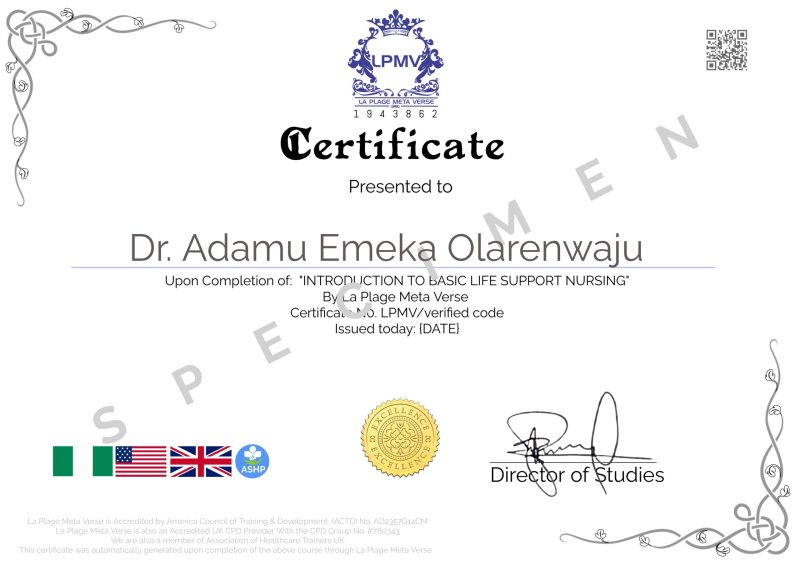Course Overview
Basic Life Support (BLS) Nursing is a fundamental training course designed to equip healthcare professionals, including nurses, with essential skills to respond effectively in life-threatening emergencies. This course focuses on providing immediate care to individuals experiencing cardiac arrest, respiratory distress, or other critical medical situations. Participants in the BLS Nursing course learn to perform crucial techniques such as cardiopulmonary resuscitation (CPR), the use of automated external defibrillators (AEDs), and relief of choking. Additionally, the course emphasizes teamwork, communication, and decision-making in high-pressure scenarios. BLS Nursing training is essential for healthcare providers to enhance patient outcomes and save lives by delivering prompt and proficient care during critical situations.
What you will Learn
Certainly, here are the key learning points in bullet points for the “Basic Life Support Nursing” course:
- Cardiopulmonary Resuscitation (CPR) techniques for adults, children, and infants.
- Proper use of automated external defibrillators (AEDs).
- Clearing airway obstructions in conscious and unconscious patients.
- Administering abdominal thrusts (Heimlich maneuver) for choking relief.
- Rapid assessment and prioritization of patient care.
- Effective communication and teamwork in emergency situations.
- Utilizing barrier devices for infection control during CPR.
- Special considerations for diverse patient populations.
- Legal and ethical aspects of providing BLS care.
- Continuous skill assessment and refinement.
- Critical thinking and adaptability in high-pressure scenarios.
Who Should Learn
Here are the individuals who should consider taking the “Basic Life Support Nursing” course, in bullet points:
- Nurses and nursing students.
- Physicians and medical students.
- Emergency medical technicians (EMTs).
- Paramedics.
- Healthcare professionals (e.g., pharmacists, dentists, physical therapists).
- Healthcare students pursuing clinical degrees.
- Lifeguards and swimming instructors.
- Childcare providers and daycare staff.
- Teachers and school staff.
- Anyone interested in acquiring lifesaving skills for emergency situations.
Career Opportunities
Career opportunities that can benefit from a course in “Basic Life Support Nursing,” in bullet points, include:
- Registered Nurse (RN): Incorporating BLS skills into routine patient care.
- Nurse Practitioner (NP): Ensuring emergency preparedness in advanced nursing roles.
- Emergency Medical Technician (EMT): Responding to emergencies and providing pre-hospital care.
- Paramedic: Delivering advanced life support and critical care in emergencies.
- Physician: Enhancing patient care skills with life-saving interventions.
- Hospital Administrator: Ensuring staff readiness and compliance with BLS protocols.
- Healthcare Educator: Teaching BLS and CPR courses to healthcare professionals and the community.
- School Nurse: Safeguarding students’ health and responding to emergencies.
- Clinic Nurse: Offering BLS support in outpatient care settings.
- Medical Instructor: Training future healthcare providers in BLS techniques.
- Public Health Professional: Promoting community safety and education on basic life support.
- First Aid Instructor: Teaching BLS and CPR skills to the general public.
- Lifeguard or Swimming Instructor: Providing immediate assistance in aquatic emergencies.
- Occupational Health Nurse: Assisting employees with on-the-job injuries and illnesses.
- Sports Medicine Practitioner: Responding to athletic injuries with BLS knowledge.
These career opportunities span various healthcare settings and emphasize the importance of BLS skills in enhancing patient safety and emergency response capabilities.
Prerequisites
This course does not require participants to have a specific entry requirement. Those who are interested can sign up.
Course Duration & Online Support
Duration depends on the learner’s ability to cope with the pace and scope of the course. Self-study allows participants to complete the course at their own pace. Support extensions are also available if students fail to do so within that period.
Assessment
To successfully complete the course, students are required to complete various tests and assessments. You may be required to get a link from our Training Provider. Your test will be reviewed and graded by our system. You may attempt only twice.
Get a Completion Certificate.
La Plage Meta Verse is an Accredited CPD Provider. Upon successful completion of the course, students will be able to gain an international Accredited Certificate. Share your certificate with prospective employers and your professional network on all social media platforms.

